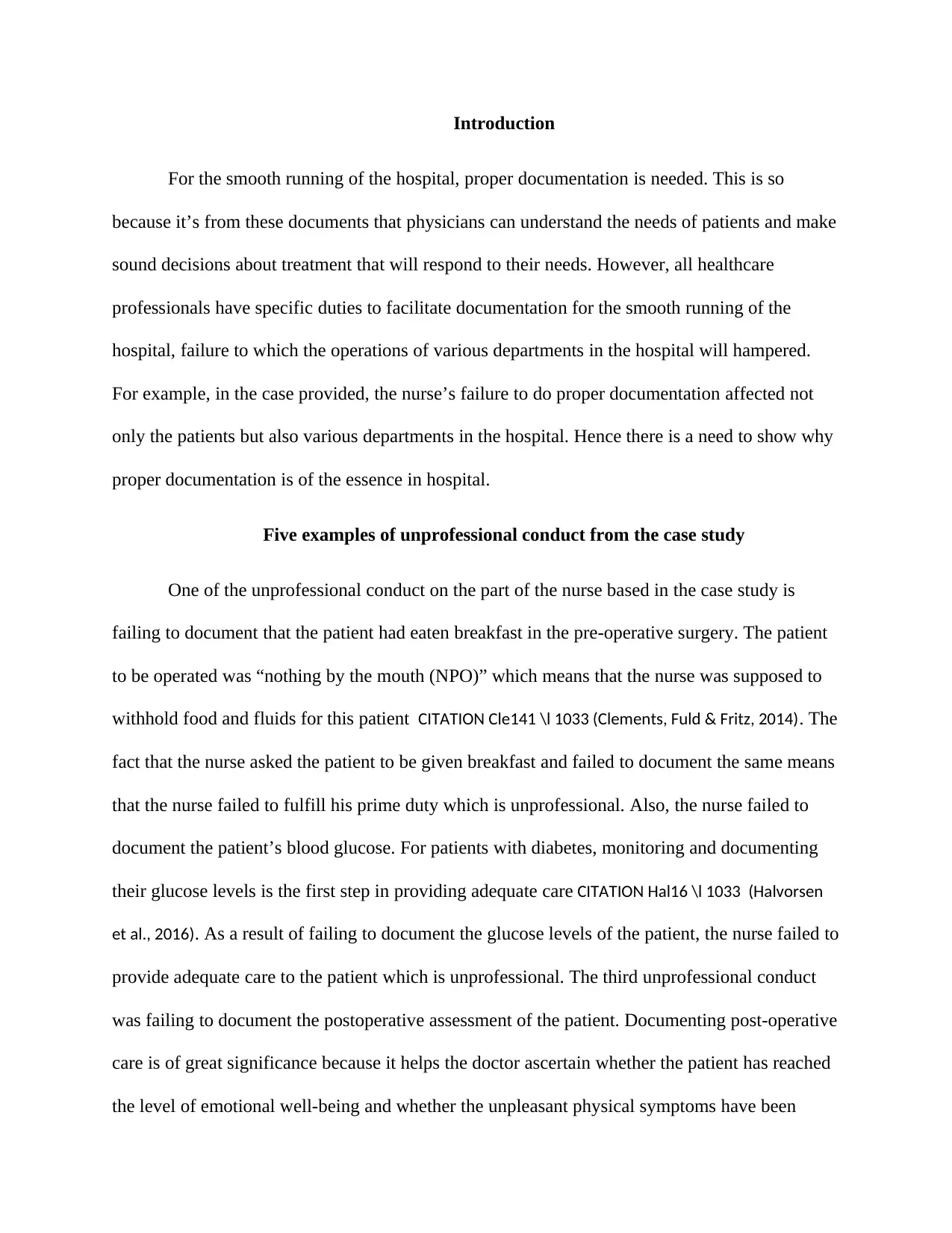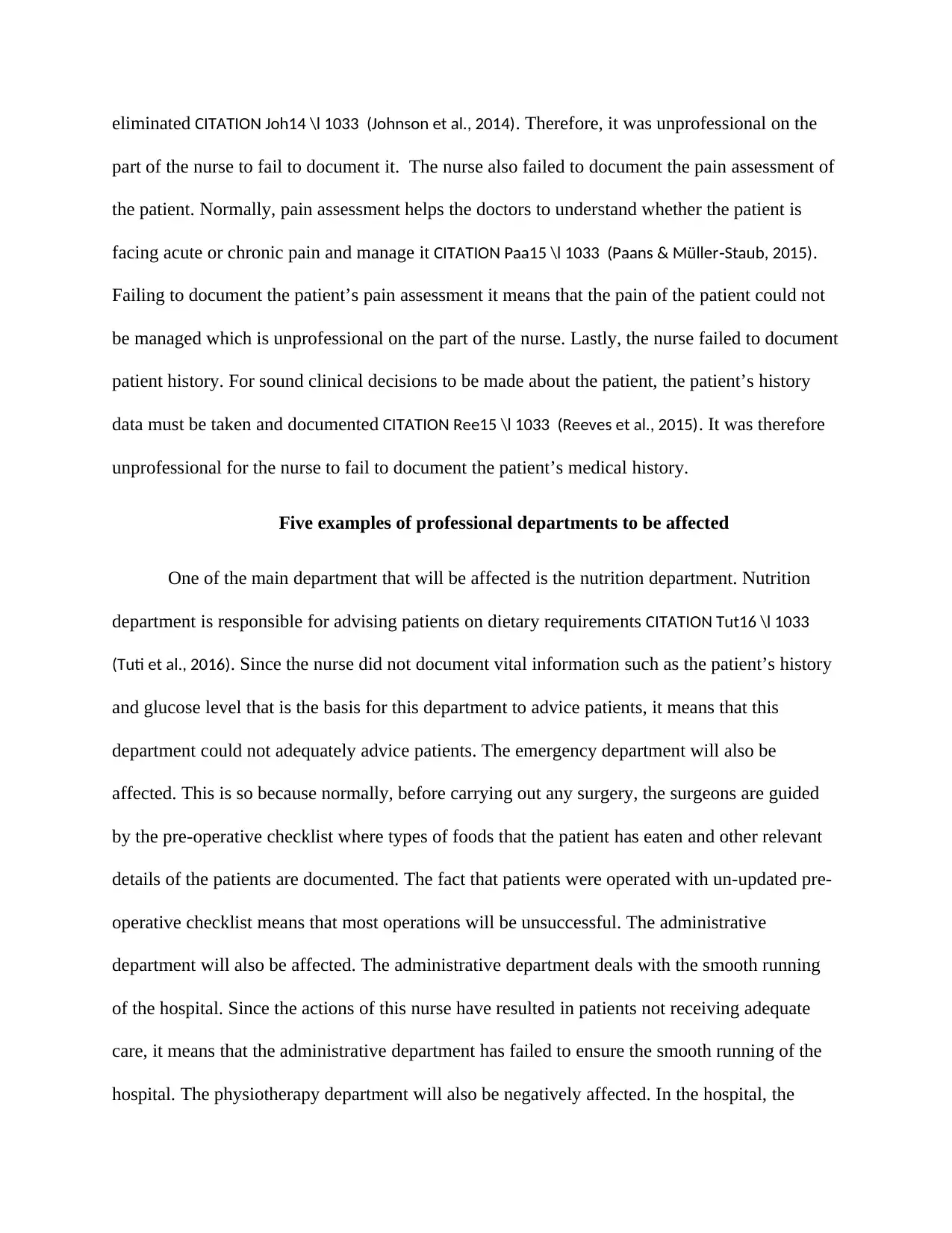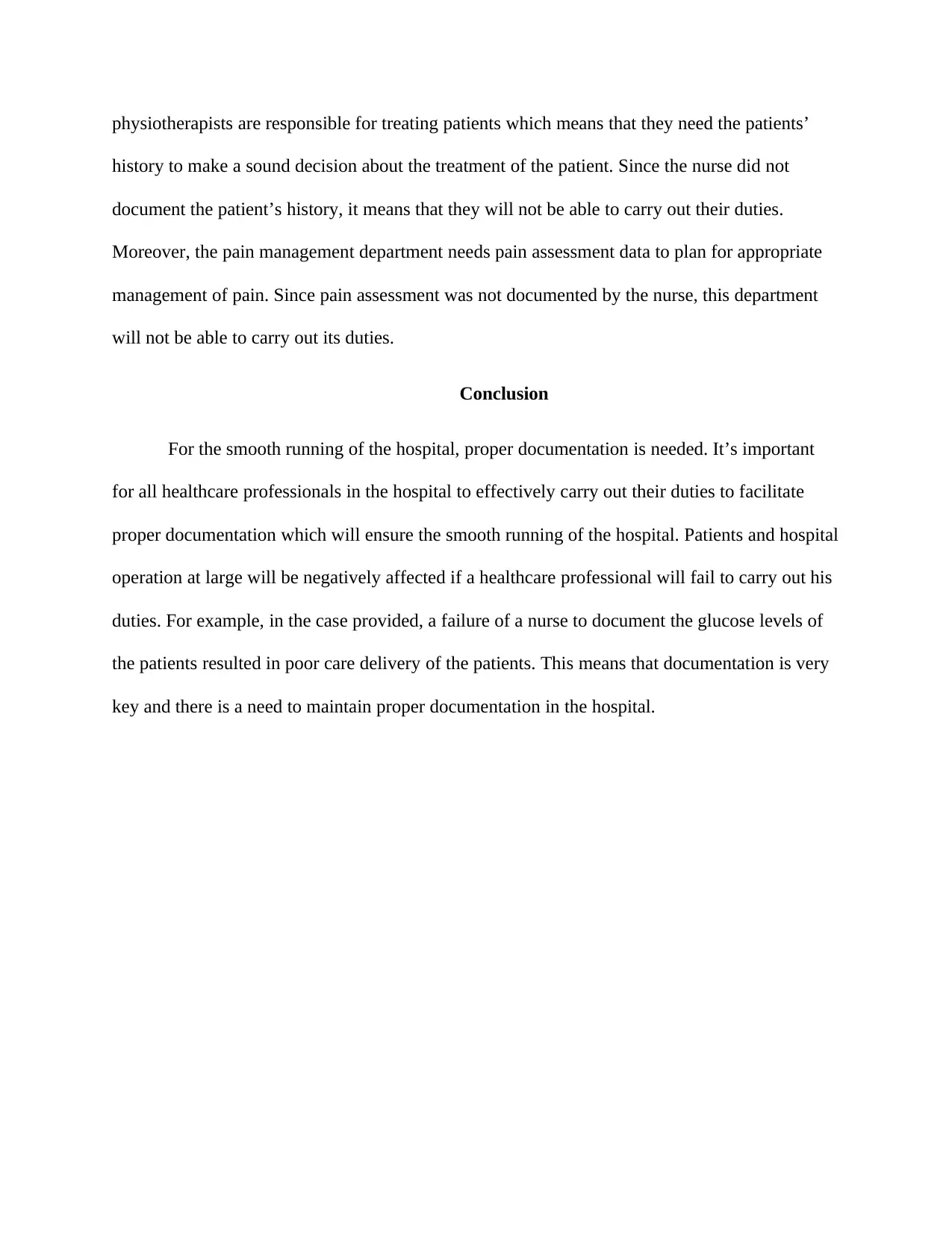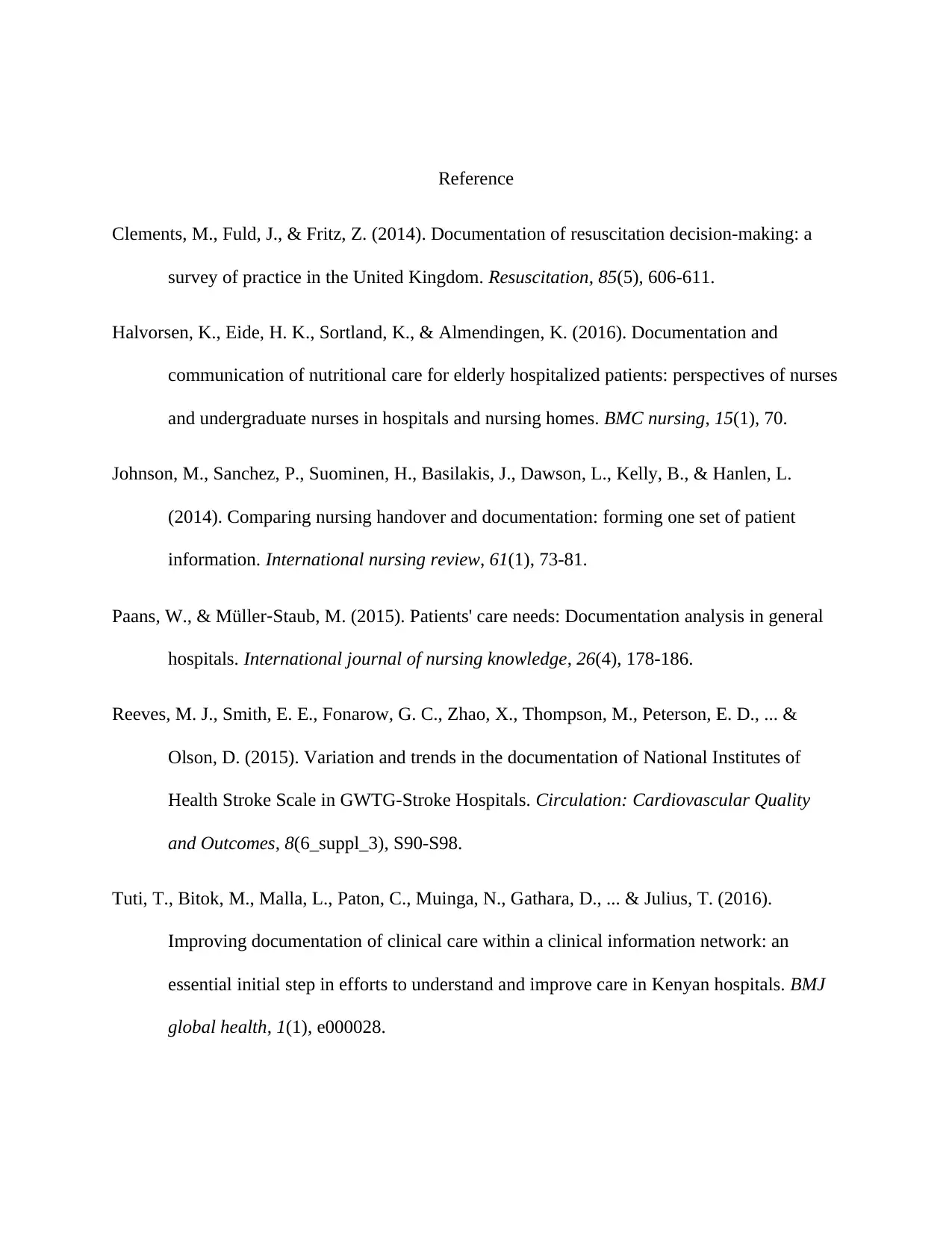HUCL1301 Reflective Essay: Importance of Documentation in Healthcare
VerifiedAdded on 2022/10/09
|4
|1255
|17
Essay
AI Summary
This essay analyzes the critical role of proper documentation in healthcare, emphasizing its impact on patient care and hospital operations. The assignment is based on a case study that details instances of unprofessional conduct by a nurse, including failures in documenting pre-operative information, blood glucose levels, post-operative assessments, pain assessments, and patient history. The essay explores how these failures affect various hospital departments, such as nutrition, emergency, administration, physiotherapy, and pain management, hindering their ability to provide adequate care. The conclusion underscores the necessity of effective documentation by all healthcare professionals to ensure smooth hospital functioning and optimal patient outcomes. The essay references several scholarly articles to support its arguments, highlighting the legal and practical significance of accurate record-keeping in the healthcare setting.

Introduction
For the smooth running of the hospital, proper documentation is needed. This is so
because it’s from these documents that physicians can understand the needs of patients and make
sound decisions about treatment that will respond to their needs. However, all healthcare
professionals have specific duties to facilitate documentation for the smooth running of the
hospital, failure to which the operations of various departments in the hospital will hampered.
For example, in the case provided, the nurse’s failure to do proper documentation affected not
only the patients but also various departments in the hospital. Hence there is a need to show why
proper documentation is of the essence in hospital.
Five examples of unprofessional conduct from the case study
One of the unprofessional conduct on the part of the nurse based in the case study is
failing to document that the patient had eaten breakfast in the pre-operative surgery. The patient
to be operated was “nothing by the mouth (NPO)” which means that the nurse was supposed to
withhold food and fluids for this patient CITATION Cle141 \l 1033 (Clements, Fuld & Fritz, 2014). The
fact that the nurse asked the patient to be given breakfast and failed to document the same means
that the nurse failed to fulfill his prime duty which is unprofessional. Also, the nurse failed to
document the patient’s blood glucose. For patients with diabetes, monitoring and documenting
their glucose levels is the first step in providing adequate care CITATION Hal16 \l 1033 (Halvorsen
et al., 2016). As a result of failing to document the glucose levels of the patient, the nurse failed to
provide adequate care to the patient which is unprofessional. The third unprofessional conduct
was failing to document the postoperative assessment of the patient. Documenting post-operative
care is of great significance because it helps the doctor ascertain whether the patient has reached
the level of emotional well-being and whether the unpleasant physical symptoms have been
For the smooth running of the hospital, proper documentation is needed. This is so
because it’s from these documents that physicians can understand the needs of patients and make
sound decisions about treatment that will respond to their needs. However, all healthcare
professionals have specific duties to facilitate documentation for the smooth running of the
hospital, failure to which the operations of various departments in the hospital will hampered.
For example, in the case provided, the nurse’s failure to do proper documentation affected not
only the patients but also various departments in the hospital. Hence there is a need to show why
proper documentation is of the essence in hospital.
Five examples of unprofessional conduct from the case study
One of the unprofessional conduct on the part of the nurse based in the case study is
failing to document that the patient had eaten breakfast in the pre-operative surgery. The patient
to be operated was “nothing by the mouth (NPO)” which means that the nurse was supposed to
withhold food and fluids for this patient CITATION Cle141 \l 1033 (Clements, Fuld & Fritz, 2014). The
fact that the nurse asked the patient to be given breakfast and failed to document the same means
that the nurse failed to fulfill his prime duty which is unprofessional. Also, the nurse failed to
document the patient’s blood glucose. For patients with diabetes, monitoring and documenting
their glucose levels is the first step in providing adequate care CITATION Hal16 \l 1033 (Halvorsen
et al., 2016). As a result of failing to document the glucose levels of the patient, the nurse failed to
provide adequate care to the patient which is unprofessional. The third unprofessional conduct
was failing to document the postoperative assessment of the patient. Documenting post-operative
care is of great significance because it helps the doctor ascertain whether the patient has reached
the level of emotional well-being and whether the unpleasant physical symptoms have been
Paraphrase This Document
Need a fresh take? Get an instant paraphrase of this document with our AI Paraphraser

eliminated CITATION Joh14 \l 1033 (Johnson et al., 2014). Therefore, it was unprofessional on the
part of the nurse to fail to document it. The nurse also failed to document the pain assessment of
the patient. Normally, pain assessment helps the doctors to understand whether the patient is
facing acute or chronic pain and manage it CITATION Paa15 \l 1033 (Paans & Müller Staub, 2015)‐ .
Failing to document the patient’s pain assessment it means that the pain of the patient could not
be managed which is unprofessional on the part of the nurse. Lastly, the nurse failed to document
patient history. For sound clinical decisions to be made about the patient, the patient’s history
data must be taken and documented CITATION Ree15 \l 1033 (Reeves et al., 2015). It was therefore
unprofessional for the nurse to fail to document the patient’s medical history.
Five examples of professional departments to be affected
One of the main department that will be affected is the nutrition department. Nutrition
department is responsible for advising patients on dietary requirements CITATION Tut16 \l 1033
(Tuti et al., 2016). Since the nurse did not document vital information such as the patient’s history
and glucose level that is the basis for this department to advice patients, it means that this
department could not adequately advice patients. The emergency department will also be
affected. This is so because normally, before carrying out any surgery, the surgeons are guided
by the pre-operative checklist where types of foods that the patient has eaten and other relevant
details of the patients are documented. The fact that patients were operated with un-updated pre-
operative checklist means that most operations will be unsuccessful. The administrative
department will also be affected. The administrative department deals with the smooth running
of the hospital. Since the actions of this nurse have resulted in patients not receiving adequate
care, it means that the administrative department has failed to ensure the smooth running of the
hospital. The physiotherapy department will also be negatively affected. In the hospital, the
part of the nurse to fail to document it. The nurse also failed to document the pain assessment of
the patient. Normally, pain assessment helps the doctors to understand whether the patient is
facing acute or chronic pain and manage it CITATION Paa15 \l 1033 (Paans & Müller Staub, 2015)‐ .
Failing to document the patient’s pain assessment it means that the pain of the patient could not
be managed which is unprofessional on the part of the nurse. Lastly, the nurse failed to document
patient history. For sound clinical decisions to be made about the patient, the patient’s history
data must be taken and documented CITATION Ree15 \l 1033 (Reeves et al., 2015). It was therefore
unprofessional for the nurse to fail to document the patient’s medical history.
Five examples of professional departments to be affected
One of the main department that will be affected is the nutrition department. Nutrition
department is responsible for advising patients on dietary requirements CITATION Tut16 \l 1033
(Tuti et al., 2016). Since the nurse did not document vital information such as the patient’s history
and glucose level that is the basis for this department to advice patients, it means that this
department could not adequately advice patients. The emergency department will also be
affected. This is so because normally, before carrying out any surgery, the surgeons are guided
by the pre-operative checklist where types of foods that the patient has eaten and other relevant
details of the patients are documented. The fact that patients were operated with un-updated pre-
operative checklist means that most operations will be unsuccessful. The administrative
department will also be affected. The administrative department deals with the smooth running
of the hospital. Since the actions of this nurse have resulted in patients not receiving adequate
care, it means that the administrative department has failed to ensure the smooth running of the
hospital. The physiotherapy department will also be negatively affected. In the hospital, the

physiotherapists are responsible for treating patients which means that they need the patients’
history to make a sound decision about the treatment of the patient. Since the nurse did not
document the patient’s history, it means that they will not be able to carry out their duties.
Moreover, the pain management department needs pain assessment data to plan for appropriate
management of pain. Since pain assessment was not documented by the nurse, this department
will not be able to carry out its duties.
Conclusion
For the smooth running of the hospital, proper documentation is needed. It’s important
for all healthcare professionals in the hospital to effectively carry out their duties to facilitate
proper documentation which will ensure the smooth running of the hospital. Patients and hospital
operation at large will be negatively affected if a healthcare professional will fail to carry out his
duties. For example, in the case provided, a failure of a nurse to document the glucose levels of
the patients resulted in poor care delivery of the patients. This means that documentation is very
key and there is a need to maintain proper documentation in the hospital.
history to make a sound decision about the treatment of the patient. Since the nurse did not
document the patient’s history, it means that they will not be able to carry out their duties.
Moreover, the pain management department needs pain assessment data to plan for appropriate
management of pain. Since pain assessment was not documented by the nurse, this department
will not be able to carry out its duties.
Conclusion
For the smooth running of the hospital, proper documentation is needed. It’s important
for all healthcare professionals in the hospital to effectively carry out their duties to facilitate
proper documentation which will ensure the smooth running of the hospital. Patients and hospital
operation at large will be negatively affected if a healthcare professional will fail to carry out his
duties. For example, in the case provided, a failure of a nurse to document the glucose levels of
the patients resulted in poor care delivery of the patients. This means that documentation is very
key and there is a need to maintain proper documentation in the hospital.
⊘ This is a preview!⊘
Do you want full access?
Subscribe today to unlock all pages.

Trusted by 1+ million students worldwide

Reference
Clements, M., Fuld, J., & Fritz, Z. (2014). Documentation of resuscitation decision-making: a
survey of practice in the United Kingdom. Resuscitation, 85(5), 606-611.
Halvorsen, K., Eide, H. K., Sortland, K., & Almendingen, K. (2016). Documentation and
communication of nutritional care for elderly hospitalized patients: perspectives of nurses
and undergraduate nurses in hospitals and nursing homes. BMC nursing, 15(1), 70.
Johnson, M., Sanchez, P., Suominen, H., Basilakis, J., Dawson, L., Kelly, B., & Hanlen, L.
(2014). Comparing nursing handover and documentation: forming one set of patient
information. International nursing review, 61(1), 73-81.
Paans, W., & Müller‐Staub, M. (2015). Patients' care needs: Documentation analysis in general
hospitals. International journal of nursing knowledge, 26(4), 178-186.
Reeves, M. J., Smith, E. E., Fonarow, G. C., Zhao, X., Thompson, M., Peterson, E. D., ... &
Olson, D. (2015). Variation and trends in the documentation of National Institutes of
Health Stroke Scale in GWTG-Stroke Hospitals. Circulation: Cardiovascular Quality
and Outcomes, 8(6_suppl_3), S90-S98.
Tuti, T., Bitok, M., Malla, L., Paton, C., Muinga, N., Gathara, D., ... & Julius, T. (2016).
Improving documentation of clinical care within a clinical information network: an
essential initial step in efforts to understand and improve care in Kenyan hospitals. BMJ
global health, 1(1), e000028.
Clements, M., Fuld, J., & Fritz, Z. (2014). Documentation of resuscitation decision-making: a
survey of practice in the United Kingdom. Resuscitation, 85(5), 606-611.
Halvorsen, K., Eide, H. K., Sortland, K., & Almendingen, K. (2016). Documentation and
communication of nutritional care for elderly hospitalized patients: perspectives of nurses
and undergraduate nurses in hospitals and nursing homes. BMC nursing, 15(1), 70.
Johnson, M., Sanchez, P., Suominen, H., Basilakis, J., Dawson, L., Kelly, B., & Hanlen, L.
(2014). Comparing nursing handover and documentation: forming one set of patient
information. International nursing review, 61(1), 73-81.
Paans, W., & Müller‐Staub, M. (2015). Patients' care needs: Documentation analysis in general
hospitals. International journal of nursing knowledge, 26(4), 178-186.
Reeves, M. J., Smith, E. E., Fonarow, G. C., Zhao, X., Thompson, M., Peterson, E. D., ... &
Olson, D. (2015). Variation and trends in the documentation of National Institutes of
Health Stroke Scale in GWTG-Stroke Hospitals. Circulation: Cardiovascular Quality
and Outcomes, 8(6_suppl_3), S90-S98.
Tuti, T., Bitok, M., Malla, L., Paton, C., Muinga, N., Gathara, D., ... & Julius, T. (2016).
Improving documentation of clinical care within a clinical information network: an
essential initial step in efforts to understand and improve care in Kenyan hospitals. BMJ
global health, 1(1), e000028.
1 out of 4
Related Documents
Your All-in-One AI-Powered Toolkit for Academic Success.
+13062052269
info@desklib.com
Available 24*7 on WhatsApp / Email
![[object Object]](/_next/static/media/star-bottom.7253800d.svg)
Unlock your academic potential
Copyright © 2020–2026 A2Z Services. All Rights Reserved. Developed and managed by ZUCOL.



